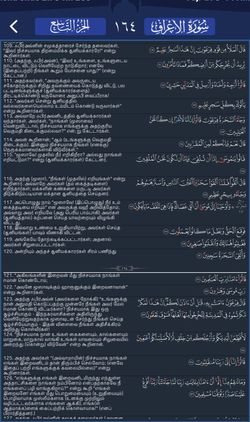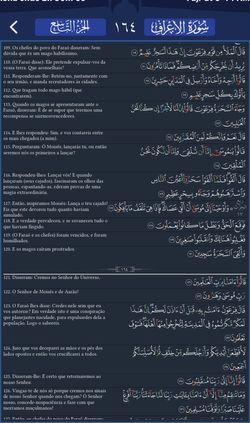Dec 8, 2024
Surah Al A'araf (Verses 109-126)
بِسْمِ ٱللَّٰهِ ٱلرَّحْمَٰنِ ٱلرَّحِيمِ,
(bi-smi llāhi r-raḥmāni r-raḥīm)
"In the name of Allah, the Most Gracious, the Most Merciful"
"Assalamualaikum/Hello and welcome! It's a pleasure to have you join us on this platform. Feel free to explore and engage with our community."
Feel free to join the cafe and our Instagram page for notifications and updates;
Hilokal;
https://hilokal.page.link/eUxfM
Instagram;
https://instagram.com/ideologyovlife?igshid=NjIwNzIyMDk2Mg==
Chapter 7, Verses 109-126
Surah Al-A'araf, Verses 109-126
Recitation.
Translation.
Tafseer.
LESSON # 15 Chapter # 7 (Surah Al A'araf)
For English Reference;
https://www.islamicstudies.info/tafheem.php?sura=7&verse=109&to=126
For Urdu Reference;
https://tafheem.net/islamikitabein/urduref.php?sura=7&verse=109-126
Translations;
Please follow the sequence to find your language;
English
Urdu
Hindi
Tamil
Bangali
Korean
Kurdish
Turkish
Portuguese
Spanish
LESSON # 15 of Chapter # 7.
Difficult Vocabularies from LESSON # 15 (Chapter # 7 Verses 109-126)
Verse # 110.
1- Destitute. (Adjective)
(Without money, food, a home, or possessions.)
2- Serpent. (Noun)
(A snake.)
3- Entrenched. (Adjective)
(Entrenched ideas are so fixed or have existed for so long that they cannot be changed.)
4- Furore. (Noun)
(A sudden excited or angry reaction to something by a lot of people.)
5- Coteric. (Noun)
(A small group of people with shared interests, often one that does not want other people to join them.)
6- Mettle. (Noun)
(Ability and determination when competing or doing something difficult.)
7- Rigorous. (Adjective)
(Careful to look at or consider every part of something to make certain it is correct or safe.)
8- Short Shrift. (Noun)
(If you get or are given short shrift by someone, you are treated without sympathy and given little attention.)
9- Unnerve. (Verb)
(To make someone feel less confident and slightly frightened.)
10- Upheaval. (Noun)
(A great change, especially causing or involving much difficulty, activity, or trouble.)
Verse # 111.
11- Heralds. (Verb)
(To be a sign that something important, and often good, is starting to happen, or to make something publicly known, especially by celebrating or praising it.)
Verse # 122.
12- Sceptical. (Adjective)
(Doubting that something is true or useful.)
13- Unanimously. (Adverb)
(In a way that is agreed or supported by everyone in a group.)
14- Feat. (Noun)
(Something difficult needing a lot of skill, strength, courage, etc. to achieve it.)
Verse # 126.
15- Perseverance. (Noun)
(Continued effort to do or achieve something, even when this is difficult or takes a long time.)
16- Concoct. (Verb)
(To make something, usually food, by adding several different parts together, often in a way that is original or not planned.)
16- Accomplice. (Noun)
(A person who helps someone else to commit a crime or to do something morally wrong.)
17- Collusion. (Noun)
(Agreement between people to act together secretly or illegally in order to deceive or cheat someone.)
18- Ineffectual. (Adjective)
(Not skilled at achieving, or not able to produce, good results.)
19- Conviction. (Noun)
(The fact of officially being found to be guilty of a particular crime, or the act of officially finding someone guilty.)
20- Pretence. (Noun)
(A way of behaving that is intended to deceive people.)
21- Brazenly. (Adverb)
(In an obvious way, with no effort to hide something.)
22- Tremendous. (Adjective)
(Very great in amount or level, or extremely good.)
23- Instantaneous. (Adjective)
(Happening immediately, without any delay.)
24- Vindicate. (Verb)
(To prove that what someone said or did was right or true, after other people thought it was wrong.)
25- Pecuniary. (Adjective)
(Relating to money.)
26- Resoluteness. (Noun)
(The quality of being determined and strong.)
27- Contemptuously. (Adverb)
(In a way that shows strong dislike or a lack of respect for someone or something.)
28- Readiness. (Noun)
(Willingness or a state of being prepared for something.)











LESSON # 15 of Chapter # 7.
References from LESSON # 15 (Chapter # 7 Verses 109-126)
Verse # 117.
1- Al Qur'aan (20:69 nn 42)
https://islamicstudies.info/reference.php?sura=20&verse=69¬e=42
2- Al Qur'aan (26:45)
https://islamicstudies.info/reference.php?sura=26&verse=45
LESSON # 15 of Chapter # 7.
Summary of Verses (109-126) of Chapter # 7 Surah Al A'araf:
Here is a short summary of the verses of Surah Al-A'raf:
1. Pharaoh's Court Concerns:
The elders of Pharaoh's people view Moses as a threat, calling him a magician who aims to overthrow their rule and expel them from their land. They are puzzled by how a humble member of the enslaved Israeli nation can pose such a challenge to Pharaoh’s mighty empire.
2. The Claim to Prophethood:
Moses’ claim to prophethood implies a call for total transformation, including political and social change. Pharaoh’s regime sees this as a threat because Moses would demand leadership and obedience from others, disrupting their power.
3. Moses’ Ability and Leadership:
Moses is seen as an extraordinary leader, trained in military skills, with past experiences proving his strength and competence. His miracles, such as the rod turning into a serpent, convince Pharaoh and his court that Moses might be supported by a supernatural force.
4. Pharaoh’s Response:
Pharaoh’s courtiers suggest that Moses’ miracles are mere sorcery, and to disprove Moses’ claims, they summon all the skilled magicians to perform a competing display of magic, hoping to make Moses' miracles seem like illusion.
5. The Magicians' Challenge:
The magicians, after being promised rewards by Pharaoh, challenge Moses to either throw his rod first or let them do so. Moses allows them to throw first, and their rods transform into serpents through their magic, impressing the people.
6. Moses' Rod Overpowers Sorcery:
Moses throws his rod, and it swallows up the magicians' fake serpents, showing that Moses’ miracle is not mere sorcery but the truth. This act exposes the magicians' magic as false.
7. Magicians’ Conversion:
The magicians, witnessing the truth, immediately believe in the Lord of the universe and fall prostrate in worship, acknowledging Moses and Aaron's Lord as the true God.
8. Pharaoh’s Retaliation:
Enraged by the defeat, Pharaoh accuses the magicians of conspiring with Moses to overthrow his rule. He threatens them with severe punishment, including crucifixion.
9. Magicians’ Resolve:
The magicians boldly respond that they will not recant their belief in God’s signs. They express readiness to endure punishment for their faith, demonstrating their sincere conversion and strong conviction in the truth of Moses’ message.
10. Pharaoh’s Desperation:
Pharaoh resorts to persecution, abandoning all pretense of justice, and attempting to force the magicians to renounce their faith. However, their unwavering faith and resolve in the face of torture highlight the transformative power of belief.
Thank you everyone for joining.
May Allah rewards all of you for your precious time spent here & may Allah keeps pouring his blessings upon you and your loved ones.
Stay safe & and blessed.
Aslamualaikum to all of you.
J A Z A K A L L A H U K H A I R E V E R Y O N E .
By undefined
18 notes ・ 2 views
English
Proficient